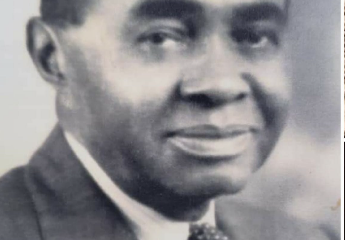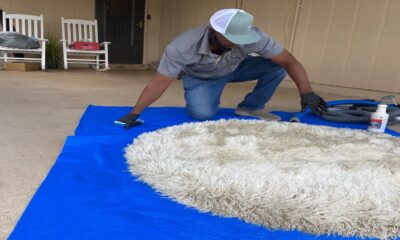Family
A Father’s Love
And I cried over and over again. I looked down into his eyes and saw my own. And I cried over and over again. I held him for the very first time. And I cried over and over again…
Reflections on African American fatherhood by Dr. Robert W. Simmons III.
 And I cried over and over again. I looked down into his eyes and saw my own. And I cried over and over again. I held him for the very first time. And I cried over and over again. These tears of joy, and marvel at God’s gift to myself and my wife, are reflective of my initial emotions associated with the birth of our son on January 5, 2011 at 1:25pm. Yet, these tears were reflective of my pain. The pain associated with my own existence as a son. The son of a Morehouse educated man, who has been absent the majority of my life due to his consistent incarceration. Looking into the eyes of my son, and seeing the strength required of my wife to give life to another human being, I cried a cry I had been containing for 36 years. Given the nature of God’s gift to my wife and I, how could a man seemingly look the other way when you have experienced the miracle associated with becoming a father?
And I cried over and over again. I looked down into his eyes and saw my own. And I cried over and over again. I held him for the very first time. And I cried over and over again. These tears of joy, and marvel at God’s gift to myself and my wife, are reflective of my initial emotions associated with the birth of our son on January 5, 2011 at 1:25pm. Yet, these tears were reflective of my pain. The pain associated with my own existence as a son. The son of a Morehouse educated man, who has been absent the majority of my life due to his consistent incarceration. Looking into the eyes of my son, and seeing the strength required of my wife to give life to another human being, I cried a cry I had been containing for 36 years. Given the nature of God’s gift to my wife and I, how could a man seemingly look the other way when you have experienced the miracle associated with becoming a father?
The role of African American men in the lives of their children has been discussed from numerous perspectives. Some have propagated a mythology that elucidates the “absent” African American father as something linked to an ethos of irresponsibility or lacking in the morale conviction to care for others. Some have linked the missing African American father to the misogynistic messages associated with some, not all, aspects of hip hop music and culture. Yet others have attempted to understand their role in the lives of their children through economics, the prison industrial complex, and other socio-political and socio-cultural issues.
Regardless of the perspective that frames our understanding of African American fathers, we must readily acknowledge that the “absent” father narrative is both useful and difficult to digest.
This narrative is useful in helping to highlight a significant issue in the African American community, and difficult to digest because all African American fathers are not absent. To ascertain images of African American fathers actively involved in the lives of their children, I am reminded of seeing an African American father walking his son into school a few weeks ago, and giving his son a big hug before he left. I am further reminded of so many of my former students in Detroit, Michigan, whose fathers regularly attended parent-teacher conferences, and attended various events.
While these positive images hold a special place in my mind and mental Rolodex, the number of African American men who seem to believe that paying child support is enough equally captures me. Further framing my understanding of the absent father, are the numbers of men who make promises to their children that they have no intention on keeping. It is not my intention to indict these fathers, but simply to point out that the history of African American men as leaders in the community AND the home requires us to be honest with ourselves and acknowledge both our successes and shortcomings.
As we embark on another rendition of African American history month in 2011, I am prayerful that African American fathers can take some time to connect with their children, and do some self-reflection. My commitment is to reflect on the following:
• What did I miss by not having my father in my life?
• What has my father’s incarceration meant for my life?
• How can I create a positive relationship with my son?
• How can I reach out to other African American fathers?
Regardless of the perspective we take on the absent or present African American father, the history of African Americans is littered with examples of how to be a father. Certainly, the media has propagated a narrative that leads us to believe that all African American fathers are absent and social deviants.
I challenge every African American father to rewrite this narrative and create a counternarrative…a counternarrative for our children to see and a counternarrative for our community to applaud.
My counternarrative begins as I started this article—And I cried over and over again. I looked down into his eyes and saw my own. And I cried over and over again. I held him for the very first time. And I cried over and over again. These tears of joy, and marvel at God’s gift to myself and my wife, are reflective of my initial emotions associated with the birth of our son on January 5, 2011 at 1:25pm.
Dr. Robert W. Simmons III is assistant professor at Loyola University, Maryland.
Read Bio.
Send a message to Robert.

-

 Black History5 months ago
Black History5 months agoThe untold story of a Black woman who founded an Alabama hospital during Jim Crow
-

 Featured8 months ago
Featured8 months ago‘No Closure’ In Town Where Five Black Residents Were Either Murdered, Died Suspiciously Or Are Missing
-

 Black History9 months ago
Black History9 months agoBlack History Lost and Found: New Research Pieces Together the Life of Prominent Texas Surgeon and Activist
-

 Featured9 months ago
Featured9 months agoFounder of “The Folding Chair” Podcast Calls Montgomery’s Brawl ‘Karma’
-

 Featured8 months ago
Featured8 months agoThousands ‘Live Their Dream’ During National Black Business Month
-

 Featured10 months ago
Featured10 months agoJuneteenth And ‘246 Years Of Free Labor’ Are Key To Conversations About Reparations

